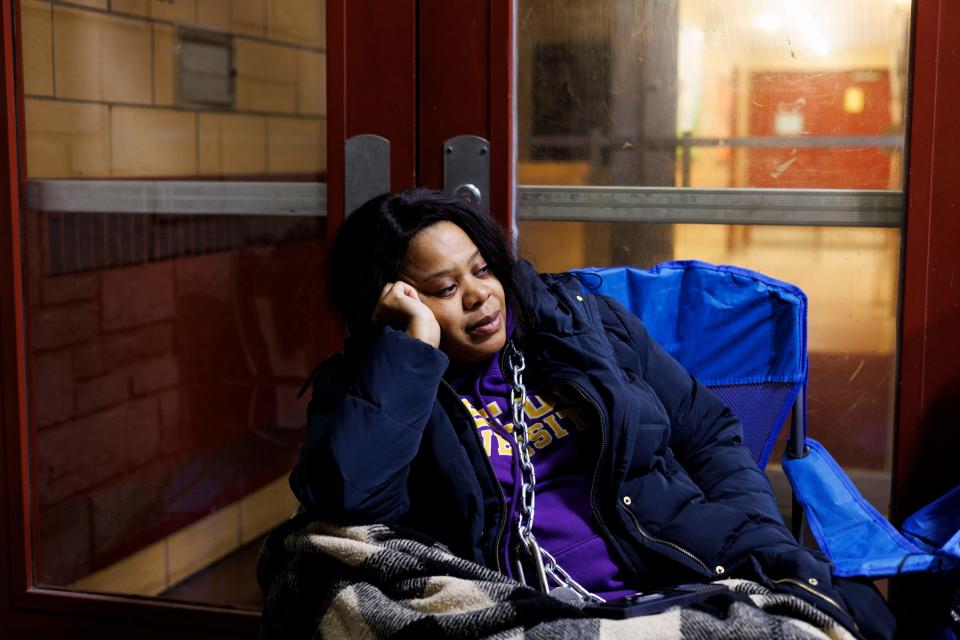Residents push back against Chicago’s race to open migrant shelters as number surpasses 18,000
- Oops!Something went wrong.Please try again later.
- Oops!Something went wrong.Please try again later.
- Oops!Something went wrong.Please try again later.
About 75 residents angered by the city’s plan to open a migrant shelter in the Amundsen Park field house surrounded Ald. Chris Taliaferro, 29th, Tuesday night.
“Amundsen Park is off the table, off-limits, not an option,” Cata Truss, 58, shouted into a cellphone held by Taliaferro, who was on the line with Mayor Brandon Johnson’s chief of staff, Richard Guidice.
“I appreciate that, ma’am; l understand what you’re saying,” Guidice said, his answer through the phone amplified by a red and white bullhorn, before Truss cut him off, jamming her finger in the air.
“No, no, sir,” she said. “We are not asking you a question. We’re saying to you, we want this park off the table. We’re saying to you that if you don’t take this park off the table, then we’re going to start looking at other means of having our wrath felt.”
Although the plan had been put on hold as city officials explored an alternative site, the residents were still wary a shelter could end up in the field house because staff had been reassigned to other parks. So they wanted to send Johnson, who lives in the Austin neighborhood, a loud and clear message.
“They can’t have this park,” said Zerlina Smith-Members, 46, who was prepared to chain herself to the field house door should migrants approach the building to sleep there. A silver chain and padlock was draped around her shoulders.
The emotionally charged scene Tuesday night is just the latest example of residents from around the city and suburbs who are pushing back against migrant shelters opening in field houses, community gathering sites and empty warehouses.
In Joliet, news that the local township would get nearly $9 million to handle incoming migrants prompted immediate opposition from city officials and some residents. Mayor Terry D’Arcy asked township officials to withdraw the grant application.
On Tuesday night, the Joliet Township Board faced residents at an hourslong meeting as they pushed back against the township’s request for the funding.
“A lack of federal leadership on this issue has resulted in asylum-seekers reaching our borders, being bused by the thousands to cities for a political stunt to create chaos and attention,” Township Supervisor Angel Contreras said to shouts from the audience.
Meanwhile, hundreds of migrants arrive every day in Chicago on buses sent from the southern border. As the weather turns rapidly colder, city officials are increasingly turning to neighborhood public spaces to house them. As of Wednesday, more than 18,000 asylum-seekers have arrived in Chicago since last fall, with many coming to the sanctuary city from Venezuela, fleeing economic or political turmoil in their country of origin.
In Ukrainian Village, the city is moving forward with a proposal to house migrants in an industrial two-story building with two bathrooms in the 500 block of North Western Avenue.
A community meeting is scheduled for 6 p.m. Thursday at Chopin Elementary, 2450 W. Rice St., to discuss plans with the city, said Ald. Gilbert Villegas, 36th, whose ward encompasses the proposed shelter site. Villegas said the building needs major renovations.
“Right now we continue to put bandages on something,” he said.
Villegas said he has public safety concerns, and hopes the city will invest in wraparound services. He’d heard about the strong community response in the 29th Ward and the decision to halt plans there.
“The community stepped up and said they didn’t want that,” he said. “So is that the key? Just get loud and we will move it? If that’s the case, I will let my community know they need to get loud about this whole situation here.”
The neighborhood has in the past rallied to support Ukrainians seeking refuge, but Villegas said the wave of migrants on buses is different.
“You have an infrastructure that’s already in place here for the Ukrainian community,” he said. “There’s been Ukrainians in this community for over 100 years. There’s already a network in place, so it’s a lot easier for them to assimilate here.”
There are now over 10,700 migrants staying in city-run shelters and over 3,000 awaiting placement in police stations and more than 700 at O’Hare International Airport. There isn’t a large established Venezuelan community in Chicago.


